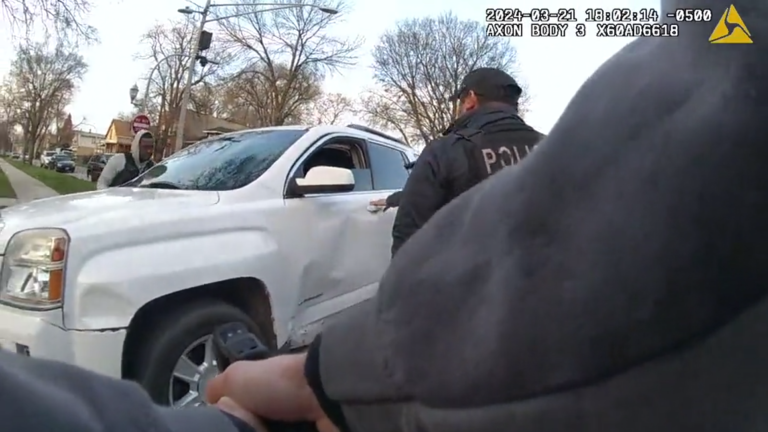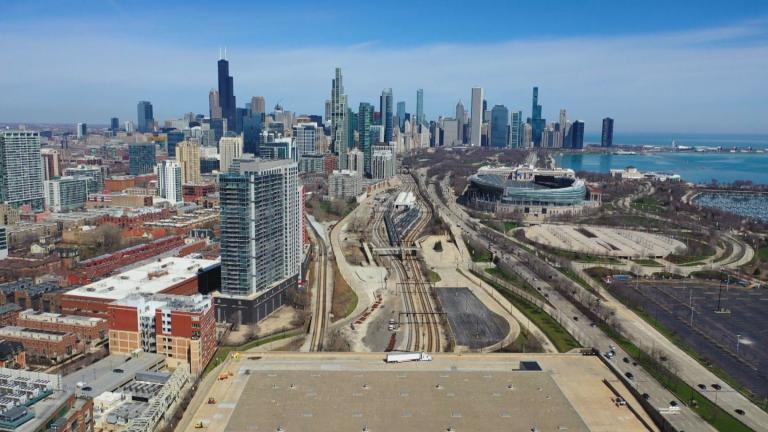Despite warnings by the president of Chicago’s largest police union that the election of Mayor Brandon Johnson would trigger an “exodus” from the Chicago Police Department, the number of sworn officers remained steady during Johnson’s first 100 days in office, according to a WTTW News analysis.
Fraternal Order of Police Lodge 7 President John Catanzara told the New York Times on March 27 that if Johnson won there would be “blood in the streets.”
“If this guy gets in, we’re going to see an exodus like we’ve never seen before,” Catanzara said, predicting that between 800 and 1,000 officers would leave the force.
However, the size of the Chicago Police Department was essentially unchanged on Johnson's 100th day in office as compared with his first day in office. CPD had 12,360 employees on Johnson’s first full day in office and 12,363 employees on Monday, according to a city database. The number of sworn officers has also remained steady, with 11,720 officers on duty as of May 1, and 11,722 on the force as of Aug. 1, according to a database maintained by the Chicago Police Department.
Catanzara did not respond to a request for comment from WTTW News.
Amid a staffing crunch for law enforcement agencies across the country, the size of the Chicago Police Department was a major issue during the mayoral runoff that pitted Johnson against former Chicago Public Schools CEO Paul Vallas, who had the endorsement of the police union.
Approximately 1,000 officers left the Chicago Police Department in 2022, while some 950 officers were hired, the most since 2018, the last time the city stepped up efforts to hire new police officers in response to an increase in crime, according to city data.
The number of sworn Chicago police officers dropped approximately 13% between August 2017 and June 2022, according to an analysis by the Civic Federation, a nonprofit government watchdog group. That decline contributed to the city’s $210.5 million police overtime bill in 2022, as police brass canceled officers’ days off to handle the increase in crime and violence.
The city of Chicago spent $126.5 million on overtime for members of the Chicago Police Department during the first six months of 2023 — nearly 50% more than during the same period in 2022 — even as the department’s staffing stabilized.
The Chicago Police Department’s 2023 budget, which totals $1.94 billion, includes 14,093 positions. The Chicago data portal listed 12,363 active employees of the Police Department, which means 87.7% of all budgeted positions are filled. That is essentially unchanged from July 2022.
Just before the mayoral election on Feb. 28, city officials and the police union reached an agreement for officers to return to the department on an expedited basis, and to streamline the hiring process for officers who want to leave another police department and join CPD.
Since March 1, 46 former Chicago Police officers have rejoined the department through the re-hire program with more going through the process currently, according to a department spokesperson.
Another 60 police officers from outside Chicago have applied to join CPD, but none have completed the hiring process, officials said.
At the same time that the department’s staffing woes have stabilized, crime continued to decline after a surge that peaked at the height of the COVID-19 pandemic.
Murders have dropped 6% during the first seven months of 2023, as compared with the same period a year ago, according to police data. The number of shootings, carjackings and crime on the CTA are also down, officials said.
Officer Wellness a Challenge for New Superintendent
Despite the fact that the exodus predicted by Catanzara never materialized, there is no evidence to suggest that officer morale has rebounded after declining precipitously during the COVID-19 pandemic and after the May 25, 2020, murder of George Floyd by a Minneapolis police officer. Floyd’s death triggered unrest as well as widespread protests demanding a new approach to policing.
Johnson said he picked Chief Larry Snelling to serve as the city’s top cop because the veteran has the respect of rank-and-file officers.
“I’m fully confident in his ability to unify and strengthen these critical public servants,” Johnson said.
Snelling, who rose through the department’s ranks, said he will not need to learn about the pressures facing Chicago’s police officers.
“For our officers who risk their lives every day to protect our residents, I know what you sacrifice on a daily basis,” Snelling said. “I know the sacrifices that your family makes when you go out to the street to keep this city safe.”
Snelling vowed to make officer wellness his highest priority by reducing mandatory overtime and canceled days off whenever possible, noting that officers are not robots but human beings.
“We need to make sure that we have the best-trained and the most well officers and well-taken-care-of officers when we put them out in the community because when these officers feel good about themselves, they feel good about the department,” Snelling said. “In order for our officers to love someone else, we have to love them.”
Next Flashpoint: Budget Forecast
Johnson will get his chance to reshape CPD in the coming months, as he crafts his first budget. During the campaign, Johnson vowed to redirect $150 million within the police department’s budget, including earmarking an additional $50 million to fund efforts to comply with court-ordered reforms.
Johnson has not committed to filling all of the department’s 1,730 vacant positions, and whether he recommends eliminating all or some of those jobs is a key question facing the mayor and one with significant policy implications.
Johnson has endorsed a proposal known as “Treatment Not Trauma,” which calls for CPD’s budget to be reduced to reopen mental health clinics and establish a citywide program that would send emergency medical technicians and mental health professionals to calls for help from those in crisis.
Axing a significant portion of those vacant positions could free up a chunk of money to begin implementing that proposal. But it would also be controversial among some members of the City Council who blame the vacancies in the Police Department for the fact that crime and violence in Chicago have yet to return to pre-pandemic levels.
Johnson is scheduled to detail the city’s projected budget deficit on Sept. 13.
Contact Heather Cherone: @HeatherCherone | (773) 569-1863 | [email protected]








